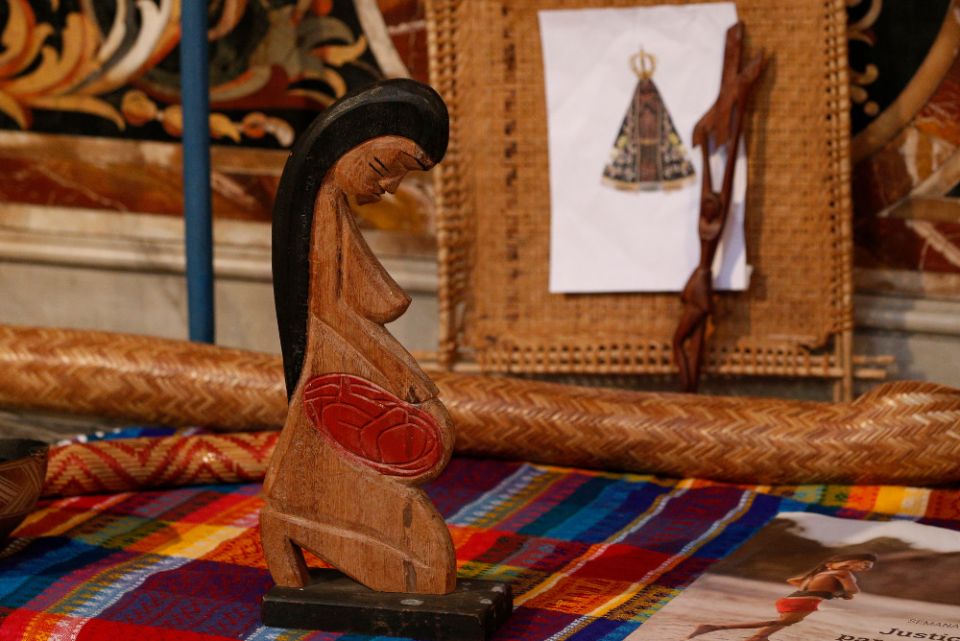
Cardinal Walter Brandmüller, one of the two remaining “dubia cardinals” who dissented from a perceived liberal tilt in the Catholic Church, praised the men who removed the controversial “Pachamama statues” from a church in Rome during last month’s Amazon Synod and threw them into the Tiber River. The German cardinal hailed the perpetrators as “courageous…prophets of today” in an Oct. 29 interview with the conservative Catholic LifeSiteNews, adding: “These two young men who threw these tasteless idols into the Tiber have not committed theft, but have done a deed, a symbolic act as we know it from the Prophets of the Old Covenant, from Jesus—see the cleansing of the Temple—and from Saint Boniface who felled the Thor Oak near Geismar.”
The incident took place Oct. 21, when two men entered Santa Maria in Traspontina Church near St. Peter’s Basilica in Rome, removed several of the Pachamama statues that had been on display there, and then threw them into the Tiber. The statues were subsequently recovered, and four days later Pope Francis issued an apology for the act, speaking in his capacity as Bishop of Rome. “As bishop of this diocese,” he wrote, “I ask forgiveness from those who have been offended by this gesture.”
The statues, identical carved wooden images of a naked pregnant indigenous Amazonian woman, had been used in several events and rituals during the Oct. 6-27 Amazon Synod, which brought together 185 bishops from across the Amazon Basin. In his statement, the Pope referred to the statues as representing Pachamama, the Earth Mother deity of many traditional peoples in South America. They had also been described during the Synod as representing “Our Lady of the Amazon,” suggesting an identification with the Virgin Mary. (Catholic News Agency, Oct. 25; National Catholic Reporter, Oct. 21)
Brandmüller was one of the four cardinals who in 2016 sent a letter to Pope Francis raising questions (or dubia, Latin for “doubts”) about his Amoris Laetitia (Joy of Love) document, which broached allowing divorced and remarried believers to receive communion. Earlier this year, Brandmüller joined with the other surviving “dubia cardinal,” Raymond Leo Burke of Missouri, to issue a letter asserting that the “horrible crime” of clerical sexual abuse of minors is part of the “plague of the homosexual agenda” that has “been spread within the Church…promoted by organized networks and protected by a…conspiracy of silence.” (Catholic News Agency, Feb. 20; National Catholic Register, Nov. 14, 2016)
The Amazon Synod—officially the Synod of Bishops for the Pan-Amazon Region—clearly represented an opposite current in the Church. Indigenous leaders from throughout the Amazon joined the bishops from Brazil, Bolivia, Peru, Ecuador, Colombia, Venezuela, Guyana, French Guiana and Suriname. Although only the bishops had voting power, the indigenous leaders—some in face paint and traditional headdresses—presided at rituals and consultations attended by the prelates. The Synod’s final document called for allowing married deacons to become priests, and said that the idea of ordaining women as deacons had been “very present” during their discussions
The document also invoked an “indigenous theology” and the need for an “Amazonian rite” in the Church. It set forth a proposed definition of “ecological sin,” as “an action or omission against God, against others, the community and the environment… It is a sin against future generations and manifests itself in acts and habits of pollution and destruction of the environmental harmony, transgressions against the principles of interdependence and the breaking of solidarity networks among creatures and against the virtue of justice.” It called for grappling with “the political and ethical dimension of our word of faith” in the face of the “prevailing destructive and extractive development model.”
“We denounce the violation of human rights and extractivist destruction,” the document stated. Making explicit reference to the threat of climate change, it called for a “a radical energy transition and the search for alternatives.” (National Catholic Reporter EarthBeat, NPR, Oct. 26; Vatican News, Oct. 24)
Photo: National Catholic Reporter




